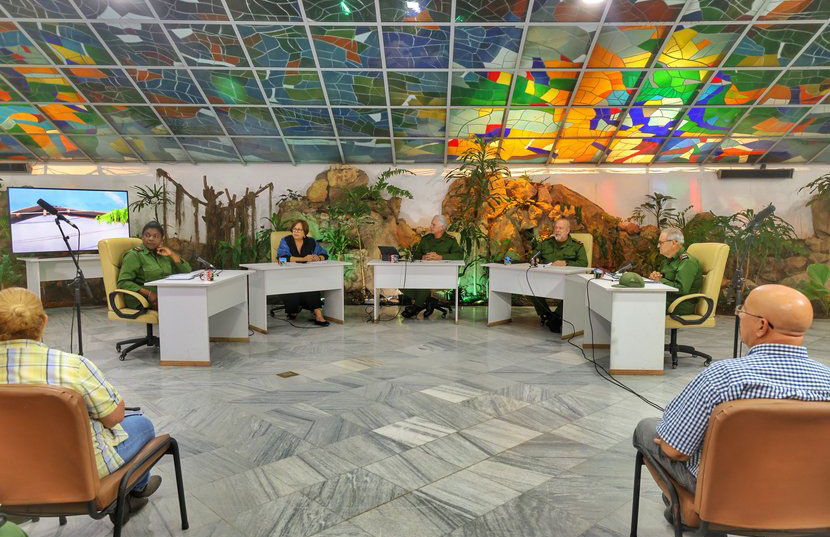Miguel Díaz-Canel Bermúdez, First Secretary of the Central Committee of the Communist Party of Cuba and President of the Republic, presided this Thursday in Santiago de Cuba over a session of the National Defense Council, broadcast on national television and radio, dedicated to examining the recovery efforts following Hurricane Melissa’s passage through the eastern part of the country, according to sources from the Presidency.
Prime Minister Manuel Marrero Cruz participated in the meeting along with Beatriz Johnson Urrutia, president of the Provincial Defense Council, and other leaders, who provided details on the cleanup, the restoration of services, and assistance to the population.
In his address, Díaz-Canel highlighted that in Guantánamo, sanitation has reached over 97 percent, electricity has been restored to more than 98 percent, mobile phone service to 87 percent, landline service to 86 percent, and water supply to 99 percent. He also reported that 4,350 homes and more than 10,000 hectares of crops have been rehabilitated.
Yoel Pérez García, president of the Guantánamo Provincial Defense Council, explained that of the 425 families assisted after the hurricane, 211 remain, and work is underway on housing solutions. He added that the epidemiological situation is complex due to the transmission of arboviruses in Baracoa and the provincial capital.
Beatriz Johnson Urrutia, president of the Provincial Defense Council of Santiago de Cuba, indicated that housing damage exceeds 24,000 cases, including collapses and partial damage, and that processing offices are being organized in the 126 defense zones. She emphasized that the priority is sanitation and healthcare.
The president toured communities in El Cristo and El Caney, where he observed progress and setbacks in the recovery efforts, and expressed his gratitude for the solidarity of construction brigades from Venezuela, as well as the support of President Nicolás Maduro Moros.
Yanetsy Terry Gutiérrez, vice president of the Provincial Defense Council of Granma, reported that four municipalities have returned to normal. More than 4,900 homes have been damaged and 52,000 hectares of farmland affected. Electrical service restoration has reached 70 percent, and water supply is being guaranteed with tanker trucks.
Joel Queipo Ruiz, president of the Holguín Provincial Defense Council, explained that more than 300,000 people were protected and progress is being made in restoring services. Eighty-six percent of the population has electricity and 89 percent has landline telephone service. One hundred and twenty-nine educational institutions have been restored, and work is underway to repair homes and family property.
Osbel Lorenzo Rodríguez, president of the Las Tunas Provincial Defense Council, indicated that the main damage was concentrated in agriculture, although the rains increased the level of reservoirs. The Metunas company has produced more than 19,000 zinc roofing sheets to support the recovery efforts in Santiago de Cuba.
Authorities agreed that the priority is to assist those affected, restore basic services, and advance the recovery of homes and crops, with the support of national and international solidarity.
Díaz-Canel called for greater popular participation in the recovery efforts after Melissa, as much remains to be rebuilt in the eastern provinces.
The president noted that some towns remain without electricity and drinking water, and that hundreds of people have been evacuated, requiring additional efforts in the hardest-hit areas.
Díaz-Canel emphasized that the active participation of mass organizations, the Committees for the Defense of the Revolution, the Federation of Cuban Women, and community structures is now essential to consolidating the recovery.
In his address, he highlighted that, despite the devastation, natural leaders from the people have emerged, mobilizing and working alongside their neighbors to rebuild what was destroyed by the hurricane.
The president called for reflection on what can be created through effort, work, and intelligence, beyond the material losses, and evoked the legacy of the nation’s heroes and martyrs as an example of dignity and courage.
Díaz-Canel urged that every visit to the Santa Ifigenia Cemetery, where historical figures such as Carlos Manuel de Céspedes, José Martí, and Fidel Castro Ruz are buried, be accompanied by a tribute of a project undertaken to aid in its recovery.
At the close of the program, he delivered an encouraging message: “From the National Defense Council, which is ours, from the Presidency in times of combat for recovery, we will continue working tirelessly and will continue informing our people.”
[ SOURCE: AGENCIA CUBANA DE NOTICIAS ]

